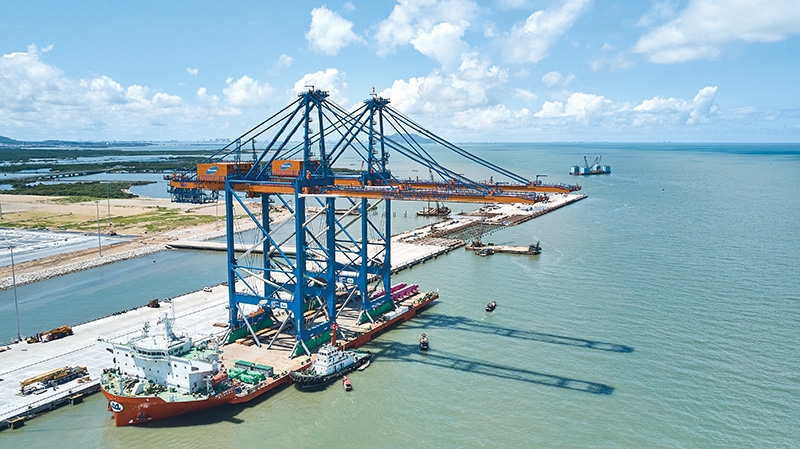Logistics industry to flourish from added exposure to world via RCEP
 |
| Logistics industry to flourish from added exposure to world via RCEP, illustration photo |
Holger Schaurig, executive vice president of Supply Chain at TM Insight Asia, said that after eight years in the making, the signing of the Regional Comprehensive Economic Partnership (RCEP) is a major success for the region. When ratified, it will integrate the whole of Asia-Pacific as well as global production networks and value chains, providing significant benefits and opportunities to ASEAN and Vietnam. According to forecasts from the World Bank, countries of the RCEP are set to see an additional average 1.5 per cent growth in GDP.
“Vietnamese players in the logistics sector are expected to be the biggest winners. With manufacturers shifting their operations to Vietnam, the country is experiencing the highest market growth rates across Southeast Asia in the past five years, and the RCEP will enable increased exports to other parts of the world, including China. This, in turn, will develop new supply chains in the region, providing growth opportunities for Vietnam’s logistics sector and beyond,” Schaurig said.
Indeed, Vietnam is a fast-growing market in the region, and despite the pandemic, it is forecast that the country’s economy will rebound at a growth rate of 6.8 per cent in 2021 and continue on this upwards trajectory.
“This growth, coupled with Vietnam’s integration in the global economy and its strategic location in Southeast Asia, positions the country well to enable and improve connectivity in the region. The RCEP will make it easier for Vietnamese businesses to expand into new markets and play a greater part in regional supply chains – all contributing to increased connectivity,” Schaurig emphasised.
However, to do so and tap into the opportunities of the RCEP, Vietnamese companies will need to advance their digital transformation to further capitalise on the benefits of the RCEP through increased competitiveness and enhanced human capital.
Russell Reed, managing director of UPS Thailand and Vietnam, said that the RCEP encompasses almost a third of global GDP, around 2.3 billion people, and countless businesses. Even in so-called ‘ordinary times’, an agreement of this size is hugely significant, but with entry into force expected in late 2021, the RCEP takes on a new significance as a regional, even global, growth stimulator for a world looking towards post-pandemic recovery.
The reduction of tariffs, unified rules of origin, and increased foreign direct investment potential afforded by the RCEP, in addition to Vietnam’s strategic location at the heart of Asia-Pacific trade, will be a boost to the Vietnamese economy and mean that many local businesses are likely to see their cross-border trading opportunities expand.
“UPS applauds the Vietnamese government’s ambition and dedication in getting this and other free trade agreements (FTAs) – such as the recent EU-Vietnam FTA – finalised, and we look forward to supporting Vietnamese businesses of all sizes achieve their goals for international growth,” Reed said.
UPS’ recent investments in Vietnam demonstrate the nation’s vital role in the future of both regional and global trade. In September, UPS introduced new Browntail flights to Hanoi and Ho Chi Minh City, which speed up transit times and provide more dedicated capacity to the country, which will boost the international competitiveness of local businesses.
“UPS will continue to work with our customers to provide the logistics services and solutions they need, while the country’s dynamic workforce, market liberalisation, and strategic location in ASEAN will reinforce its position as a key part of the global trade and manufacturing supply chain,” Reed stressed.
Experts believed that while the pandemic is driving the world to retreat from integration and accelerate deglobalisation, there are growing calls for regionalisation, and it certainly is gaining traction. Asia alone is already at the centre of two mega-regional FTAs – the Comprehensive and Progressive Agreement for Trans-Pacific Partnership and the RCEP – with the aim of progressively reducing tariffs on many products within the respective regional trade bloc, as the region looks at mitigating the negative impacts of COVID-19 and maintaining open supply chains.
Meanwhile, Vietnam is at an inflection point, with a rapidly increasing GDP, young population, and the willingness to adopt new technologies. The logistics market is in a transition stage and demand for logistics is rising strongly.
High economic growth, increasing domestic manufacturing, the rise in consumption, and booming e-commerce are some of the key drivers of the Vietnamese freight and logistics market. Thus, the domestic logistics market is expected to become more liberalised and create new opportunities to cash in on the rising demand, according to a research by Market Report World.
What the stars mean:
★ Poor ★ ★ Promising ★★★ Good ★★★★ Very good ★★★★★ Exceptional
 Tag:
Tag:
Related Contents
Latest News
More News
- The generics industry: unlocking new growth drivers (February 04, 2026 | 17:39)
- Vietnam ready to increase purchases of US goods (February 04, 2026 | 15:55)
- Steel industry faces challenges in 2026 (February 03, 2026 | 17:20)
- State corporations poised to drive 2026 growth (February 03, 2026 | 13:58)
- Why high-tech talent will define Vietnam’s growth (February 02, 2026 | 10:47)
- FMCG resilience amid varying storms (February 02, 2026 | 10:00)
- Customs reforms strengthen business confidence, support trade growth (February 01, 2026 | 08:20)
- Vietnam and US to launch sixth trade negotiation round (January 30, 2026 | 15:19)
- Digital publishing emerges as key growth driver in Vietnam (January 30, 2026 | 10:59)
- EVN signs key contract for Tri An hydropower expansion (January 30, 2026 | 10:57)






















 Mobile Version
Mobile Version